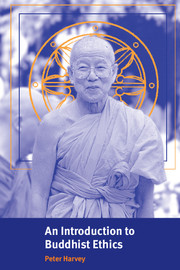Book contents
- Frontmatter
- Contents
- List of plates
- Acknowledgements
- List of abbreviations
- A note on language and pronunciation
- Introduction
- 11 THE SHARED FOUNDATIONS OF BUDDHIST ETHICS
- 12 KEY BUDDHIST VALUES
- 13 MAHĀYĀNA EMPHASES AND ADAPTATIONS
- 14 ATTITUDE TO AND TREATMENT OF THE NATURAL WORLD
- 15 ECONOMIC ETHICS
- 16 WAR AND PEACE
- 17 SUICIDE AND EUTHANASIA
- 18 ABORTION AND CONTRACEPTION
- 19 SEXUAL EQUALITY
- 10 HOMOSEXUALITY AND OTHER FORMS OF ‘QUEERNESS’
- Glossary and details of historical figures and texts
- List of references
- Useful addresses
- Index of Buddhist texts, schools cultural areas, movements and organizations
- Index of concepts
- Index of names
16 - WAR AND PEACE
Published online by Cambridge University Press: 05 June 2012
- Frontmatter
- Contents
- List of plates
- Acknowledgements
- List of abbreviations
- A note on language and pronunciation
- Introduction
- 11 THE SHARED FOUNDATIONS OF BUDDHIST ETHICS
- 12 KEY BUDDHIST VALUES
- 13 MAHĀYĀNA EMPHASES AND ADAPTATIONS
- 14 ATTITUDE TO AND TREATMENT OF THE NATURAL WORLD
- 15 ECONOMIC ETHICS
- 16 WAR AND PEACE
- 17 SUICIDE AND EUTHANASIA
- 18 ABORTION AND CONTRACEPTION
- 19 SEXUAL EQUALITY
- 10 HOMOSEXUALITY AND OTHER FORMS OF ‘QUEERNESS’
- Glossary and details of historical figures and texts
- List of references
- Useful addresses
- Index of Buddhist texts, schools cultural areas, movements and organizations
- Index of concepts
- Index of names
Summary
Enmities never cease by enmity in this world; only by non-enmity do they cease. This is an ancient law.
Dhammapada 5Buddhism is generally seen as associated with non-violence and peace. These are certainly both strongly represented in its value system. This does not mean, though, that Buddhists have always been peaceful: Buddhist countries have had their fair share of war and conflict, for most of the reasons that wars have occurred elsewhere. Yet it is difficult to find any plausible ‘Buddhist’ rationales for violence, and Buddhism has some particularly rich resources for use in dissolving conflict. Overall, it can be observed that Buddhism has had a general humanizing effect throughout much of Asia. It has tempered the excesses of rulers and martial people, helped large empires (for example China) to exist without much internal conflict, and rarely, if at all, incited wars against non-Buddhists. Moreover, in the midst of wars, Buddhist monasteries have often been havens of peace.
BUDDHIST ANALYSES OF THE CAUSES OF CONFLICT
For Buddhism, the roots of all unwholesome actions – greed, hatred and delusion – are seen as at the root of human conflicts (Nyanaponika, 1978: 50). When gripped by any of them, a person may think ‘I have power and I want power’, so as to persecute others (A. 1.201–2). Conflict often arises from attachment to material things: pleasures, property, territory, wealth, economic dominance, or political superiority.
- Type
- Chapter
- Information
- An Introduction to Buddhist EthicsFoundations, Values and Issues, pp. 239 - 285Publisher: Cambridge University PressPrint publication year: 2000



